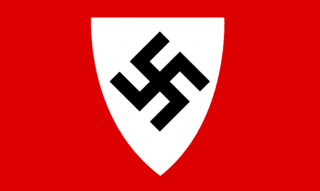Related Research Articles

The Sudeten German Party was created by Konrad Henlein under the name Sudetendeutsche Heimatfront on 1 October 1933, some months after the First Czechoslovak Republic had outlawed the German National Socialist Workers' Party. In April 1935, the party was renamed Sudetendeutsche Partei following a mandatory demand of the Czechoslovak government. The name was officially changed to Sudeten German and Carpathian German Party in November 1935.
Memel Workers Party was a communist organisation in the Memel Territory in 1925-1935. The party was founded in 1925 as a legal organization of the Communist Party of Lithuania. Hermann Suhrau and Adolf Monien served as chairmen of the party. The party was primarily supported by agricultural workers.

Parliamentary elections were held in Czechoslovakia on 27 October 1929. The Republican Party of Farmers and Peasants, emerged as the largest party, winning 46 seats in the Chamber of Deputies and 24 seats in the Senate. Voter turnout was 90.2% in the Chamber election and 78.8% for the Senate. The rightward shift of the 1925 elections was reversed, with moderate centre-left groups increasing their vote shares whilst the Communist Party suffered a set-back.
The German Electoral Coalition was a political alliance in Czechoslovakia representing Sudeten Germans.
Hermann Suhrau (1898–1947) was a German politician. Suhrau was born on 25 April 1898 in Memel, East Prussia. He was a wood- and construction worker. He was a workers' leader in inter-war Memel.
Karl Buchwald was a German politician and trade unionist.
Adolf Plennis was a Memel German politician.

The Carpathian German Party was a political party in Czechoslovakia, active amongst the Carpathian German minority of Slovakia and Subcarpathian Rus'. It began as a bourgeois centrist party, but after teaming up with the Sudeten German Party in 1933 it developed in a National Socialist orientation.

Franz Karmasin was an ethnic German politician in Czechoslovakia, who helped found the Carpathian German Party. During World War II he was state secretary of German affairs in the Slovak Republic, and rose to the rank of SS-Sturmbannführer.

The Jihlava 10th electoral district was a parliamentary constituency in the First Czechoslovak Republic for elections to the Chamber of Deputies. The seat of the District Electoral Commission was in the town of Jihlava. The constituency elected 9 members of the Chamber of Deputies.

The German Party was a Nazi political party active amongst the German minority in Slovakia from 1938 to 1945.
Josef Steinhübl was a German politician and Catholic priest.
The Soim was the parliament of the short-lived Republic of Carpatho-Ukraine. The assembly had its seat in Khust.
George Waschkies was an ethnic German politician in Lithuania. Waschkies was a farmer from Ußlöknen, East Prussia, who represented the Memel Agricultural Party in the Lithuanian parliament for a short stint in 1926–27.
Heinrich Buttkereit (1884–1947) was an ethnic German politician in Lithuania. Buttkereit was born on 23 April 1884 in Ruß. He was a farmer from Ruß. In the 1932 election to the parliament of the Klaipėda Region, he stood as candidate number 26 on the list of the Memel Agricultural Party. He was not elected in 1932, but on 13 September 1934 he filled one of seats in the assembly that had been left vacant. He remained a member of the regional parliament until the 1935 elections.
The Social Democratic Party of the Memel Territory was a social democratic political party in the Memel Territory/Klaipėda Region 1925–1935. The party was led by August Kislat and Fritz Matzies. The party was based amongst the ethnic German population of the territory.
Anton Ernst Oldofredi (1906-1982) was a German scholar and politician. In the early stage of the Second World War he served as the Volksführer of the German minority in Carpatho-Ukraine and held the post of Under-Secretary of State in the government of the short-lived Republic of Carpatho-Ukraine.
Adalbert Gabriel was a Zipser German physician and politician.
Karpatendeutsche Ärzteschaft was an organization of Carpathian German physicians in the World War II-era Slovak Republic. The organization was incorporated into the People's Welfare and People's Health Department of the German Party.
Richard Knorre was a Sudeten German politician.
References
- ↑ Norman Stone; Edward Strouhal (25 November 1989). Czechoslovakia: Crossroads and Crises, 1918–88. Palgrave Macmillan UK. p. 97. ISBN 978-1-349-10644-8.
- 1 2 3 4 5 6 7 8 9 10 11 12 13 Mads Ole Balling (1991). Von Reval bis Bukarest: Einleitung, Systematik, Quellen und Methoden, Estland, Lettland, Litauen, Polen, Tschechoslowakei. Dokumentation Verlag. pp. 283–284. ISBN 978-87-983829-3-5.
- 1 2 The Twentieth Century. Nineteenth Century and After. 1939. p. 395.
- 1 2 3 František J. Kolár; Historický ústav (Akademie věd České republiky) (1998). Politická elita meziválečného československa, 1918–1938: kdo byl kdo. Pražská edice. p. 143. ISBN 978-80-901509-8-0.
- ↑ Karl Wilhelm Fricke; Roger Engelmann (1998). Konzentrierte Schläge: Staatssicherheitsaktionen und politische Prozesse in der DDR 1953–1956. Ch. Links Verlag. p. 339. ISBN 978-3-86153-147-0.
- ↑ Zeitungs-Verlag: Fachblatt für das gesamte Zeitungswesen. 1939. pp. 138, 210.
- ↑ Dušan Tomášek (1988). Deník druhé republiky. Naše vojsko. p. 239.
- ↑ Great Britain. Foreign Office; Sir Ernest Llewellyn Woodward (1951). Documents on British Foreign Policy, 1919–1939. H.M. Stationery Office. p. 126.
- ↑ Zeitschrift für Ostforschung: Länder und Völker im östlichen Mitteleuropa. N.G. Elwert. 1958. p. 517.
- 1 2 3 Mads Ole Balling (1991). Von Reval bis Bukarest: Ungarn, Jugoslawien, Rumänien, Slowakei, Karpatenukraine, Kroatien, Memelländischer Landtag, Schlesischer Landtag, komparative Analyse, Quellen und Literatur, Register. Dokumentation Verlag. pp. 662, 665. ISBN 978-87-983829-5-9.
- 1 2 Mads Ole Balling (1991). Von Reval bis Bukarest: Ungarn, Jugoslawien, Rumänien, Slowakei, Karpatenukraine, Kroatien, Memelländischer Landtag, Schlesischer Landtag, komparative Analyse, Quellen und Literatur, Register. Dokumentation Verlag. pp. 673, 677. ISBN 978-87-983829-5-9.